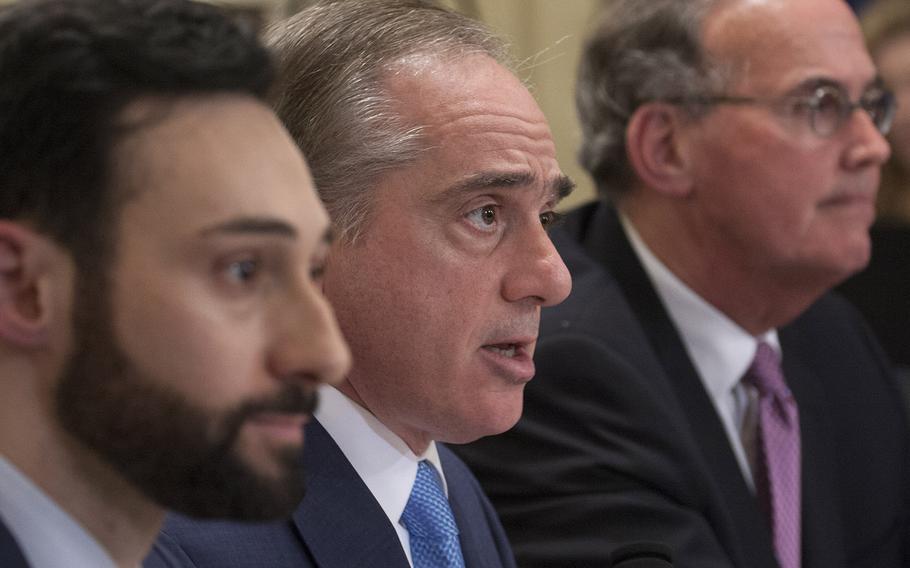
Secretary of Veterans Affairs Dr. David Shulkin, center, testifies at a House Committee on Veterans' Affairs hearing on Capitol Hill, March 7, 2017. Others testifying included Dr. Baligh Yehia, left, the Veterans Health Administration's deputy under secretary for health for community care, and VA Inspector General Michael J. Missal, right. (Joe Gromelski/Stars and Stripes)
WASHINGTON — Lawmakers on Wednesday took the initial steps to extend the troubled Veterans Choice Program, which allows veterans to receive private-sector care when they can’t get an appointment at the Department of Veterans Affairs.
The House Committee on Veterans’ Affairs voted unanimously to advance legislation that does away with an Aug. 7 expiration date on the program. It will now move to a House floor vote.
The committee’s vote followed a Tuesday night hearing, at which Sen. John McCain, R-Ariz., and VA Secretary David Shulkin urged lawmakers to extend the program to give Congress more time to create a better one.
“If we don’t do this extension, it’s going to be a disaster for American veterans,” Shulkin testified to the House committee. “Well see the same thing we did in April 2014.”
The looming expiration date is already limiting some veterans from receiving care in the private sector in cases when treatment would stretch past Aug. 7, Shulkin said.
“Into the upcoming weeks and months, we’re going to see more veterans impacted the closer we get to August,” he said. “That’s why we believe the time to act is now.”
McCain championed the $10 billion legislation that created the program in 2014, after it was discovered some veterans died while waiting for care at the VA hospital in Phoenix and other veterans suffered long waits at VA facilities across the country. The VA estimated approximately $950 million would remain by the time the program expires.
Randall Williamson, with the Government Accountability Office, testified to the committee about his hesitancy to reauthorize the program. The Government Accountability Office, as well as the Office of Inspector General, have recently released findings that veterans continue to struggle with receiving appointments through the Veterans Choice Program, citing poor management and oversight.
Williamson also said the VA has not tallied the cost of an improved program, which would require funds for new technology and more staff, as well as the cost of allowing more veterans to receive care in the private sector than do under the existing program.
Shulkin agreed the program was “complex” and hastily put together, but said Congress needed to reauthorize it now to ensure veterans using the program didn’t have gaps in care before the VA could come up with “Choice 2.0.”
Few details have been provided about “Choice 2.0,” other than Shulkin’s promise to create new criteria – and less red tape -- to determine which veterans are eligible to use it.
Shulkin told lawmakers Tuesday that before it could be implemented, the VA needed to improve its technology and install an automated scheduling system. He said the VA employees approximately 35,000 schedulers, and the department has faced criticism over scheduling errors delaying care at VA facilities and through the Veterans Choice Program. McCain reiterated the program would not be a privatization of the agency. He said Congress would need time to study the Choice 2.0 proposal “to ensure it strikes the right balance."
Earlier on Tuesday, McCain, along with senators on the Senate Committee on Veterans’ Affairs, introduced legislation in the Senate, complementary to the House bill, that would do away with the Aug. 7 expiration date.
The proposed Veterans Choice Program Improvement Act would also make the VA the primary payer for the program. Currently, the department is a secondary payer, which has led to problems reimbursing private-sector health care providers. The bill also promised to improve how the VA shares medical records with the private-sector providers who participate in the program.
wentling.nikki@stripes.com Twitter: @nikkiwentling